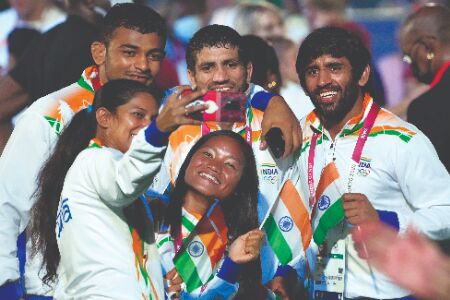Moving Forward: Tokyo hands over flag to Paris

New Delhi/Tokyo: It began with a virus and a yearlong pause. It ended with a typhoon blowing through and, still, a virus. In between: just about everything.
The Tokyo Olympics, christened with 2020 but held in mid-2021 after being interrupted for a year by the Coronavirus, glided to their conclusion in a COVID-emptied stadium Sunday night as an often surreal mixed bag for Japan and for the world.
With a large firework display adding a burst of sound to the dancing, singing and merry-making, the Japanese capital pulled the curtains down on one of history's most unique Games, handing over the flag to Paris with the message of moving forward while remembering those who lost their lives during the COVID-19 pandemic.
A rollicking closing ceremony with the theme Worlds We Share an optimistic but ironic notion at this human moment featured everything from stunt bikes to intricate light shows as it tried to convey a celebratory and liberating atmosphere for athletes after a tense two weeks.
It was set to pivot to a live feed from Paris, host of the 2024 Summer Games. And with that, the strangest Olympic Games on record began closing their books for good.
Held in the middle of a resurging pandemic, rejected by many Japanese and plagued by months of administrative problems, these Games presented logistical and medical obstacles like no other, offered up serious conversations about mental health and, when it came to sport, delivered both triumphs and a few surprising shortfalls.
A patchwork of rules kept athletes masked and apart for much of medal ceremonies, yet saw them swapping bodily fluids in some venues. That was less about being remiss than about being real: Risks that could be mitigated were, but at the same time events had to go on.
Athletes' perseverance became a central story. Mental health claimed bandwidth as never before, and athletes revealed their stories and struggles in vulnerable, sometimes excruciating fashion.
Japan's fourth Olympics, held 57 years after the 1964 Games reintroduced the country to the world after its World War II defeat, represented a planet trying to come together at a historical moment when disease and circumstance and politics had splintered it apart.
The closing ceremony Sunday reflected that and, at times, nudged the proceedings toward a sci-fi flavor.
As athletes stood in the arena for the final pomp, digital scoreboards at either end of the stadium featured what organizers called a fan video matrix, a Zoom call-like screen of videos uploaded by spectators showing themselves cheering at home.
Even the parade of athletes carrying national flags thousands of Olympians, masked and unmasked, clustering together before fanning out into the world again was affected. Volunteers carried some flags into the stadium, presumably because of rules requiring athletes to leave the country shortly after their events concluded.
In front of such formidable backdrops, athletic excellence burst through, from the Games' first gold medal (China's Yang Qian in the 10-meter air rifle on July 24) to their last (Serbia defeating Greece in men's water polo on Sunday afternoon).
Among the highlights: Allyson Felix taking a U.S.-record 11th medal in track, then stepping away from the Olympic stage. American quintuple gold medalist Caeleb Dressel's astounding performance in the pool. The emergence of surfing,skateboarding and sport climbing as popular, and viable, Olympic sports. Host country Japan's medal haul 58, its most ever.
While Tokyo is handing off the Summer Games baton to Paris for 2024, the delay has effectively crammed two Olympics together. The next Winter Games convenes in just six months in another major Asian metropolis Beijing, Japan's rival in East Asia and home to a much more authoritarian government that is expected to administer its Games in a more draconian and restrictive way, virus or no virus.
In recent weeks, lots of people officials, athletes, journalists have been chewing over how these Tokyo Games will be remembered. That's up to history, of course, but there are hints.
The runup was messy and disputed. The days of competition were fraught but, in general, without incident other than sporting milestones. Even a moderate earthquake rumbled through and was quickly forgotten. The expenses upwards of 15 billion were colossal and will echo in Tokyo long after athletes are gone.
What are the Olympic Games supposed to be? A politics-free sporting event, as the IOC insists? A bonanza for sponsors and broadcasters? One small step toward world peace? Despite all the yarn-spinning, their identity remains up in the air and that fundamental question remains.
But as the cauldron is snuffed out Sunday night after the Pandemic Olympics conclude, it's easy to argue that Tokyo can take its place as a Games that didn't fail as one that overcame a lot to even happen at all.
India was quite literally on a roller-coaster during the Tokyo Olympics. So, there was the first medal in track-and-field which also happened to be the first gold in 13 years, the first medal in hockey in 41 years, the first silver in weightlifting, the first boxing medal in nine years, the first woman with two Olympic medals, the most number of debutants ending up on the podium, and the most number of medals ever won, it all happened in one single Games for India. India's performance at the Games was bigger than the unprecedented seven medals. In Tokyo, the Indians who did well were not surprising anyone, they were living up to the billing earned over the last three years. Surprise was some of them falling short like the shooters, and the archers.
And in that lay the country's story of progress in sports. India is not quite there yet but is certainly inching closer one step at a time. With Agency inputs



